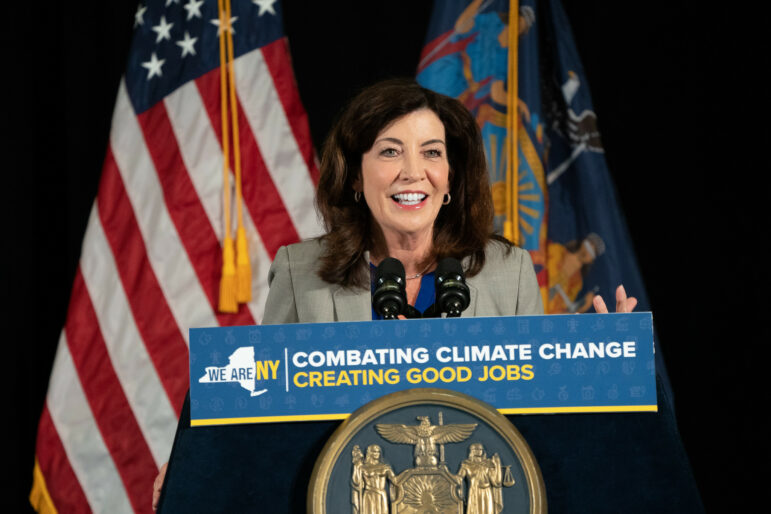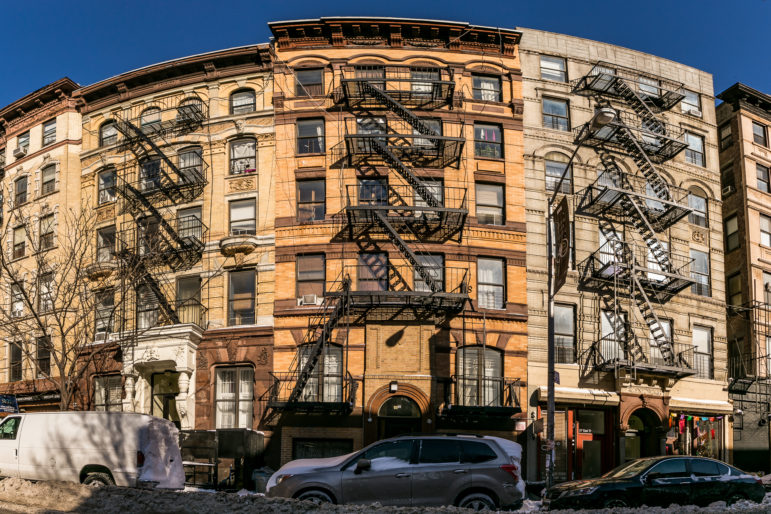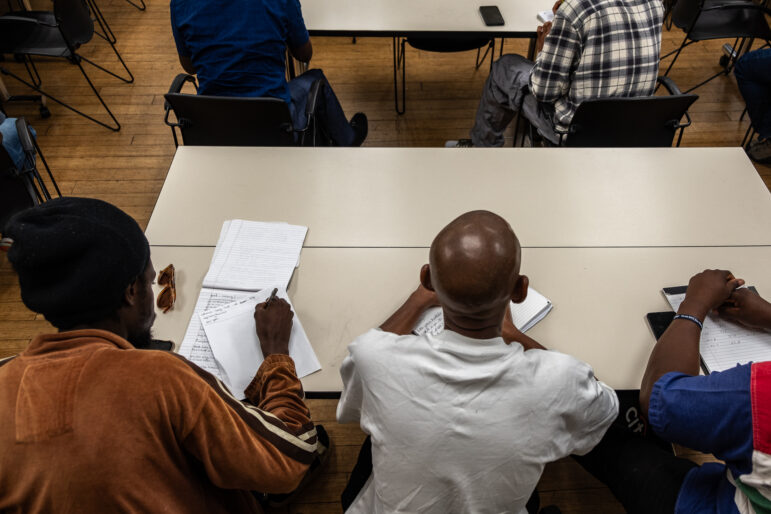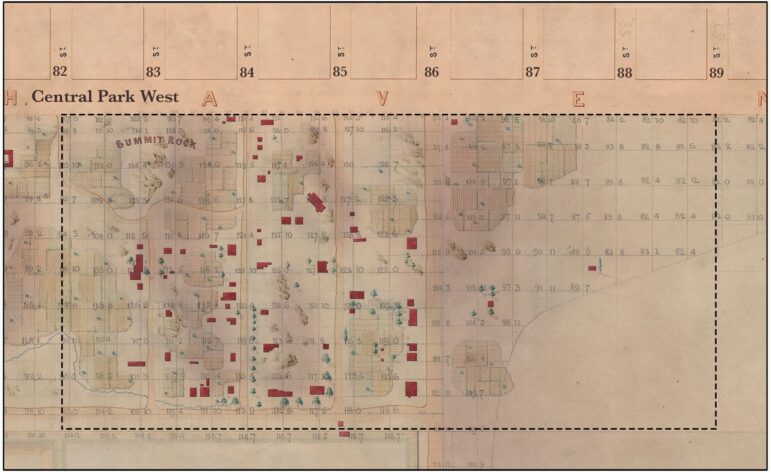Tenants and advocates say the funding would repair 40,000 apartments and help cover outstanding rent arrears accumulated during the COVID-19 pandemic.
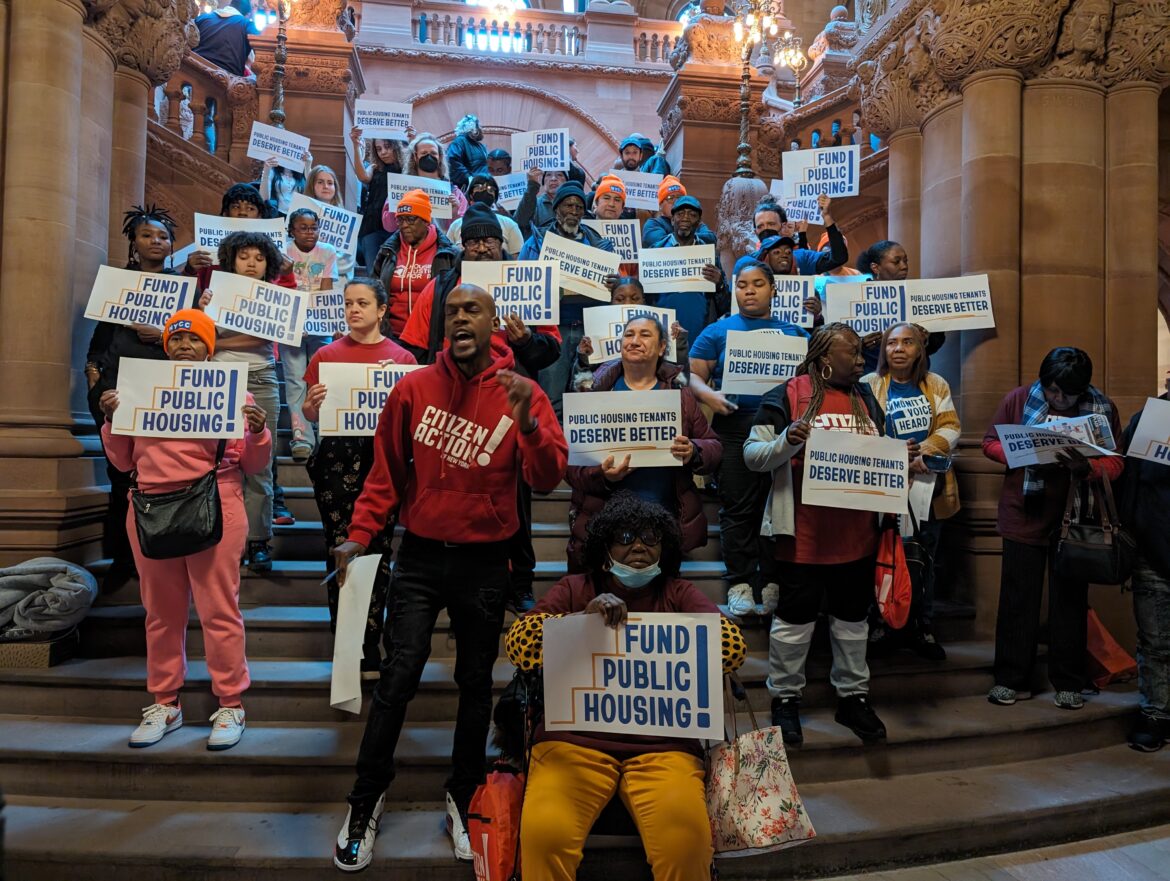
Community Voices Heard
NYCHA tenants and advocates rallying at the State Capitol Tuesday calling for additional NYCHA funding from the state.Lea la versión en español aquí
New York City Housing Authority tenants joined public housing advocates on a day trip to Albany this week, demanding billions of dollars in state funding to repair tens of thousands of apartments and prevent evictions for unpaid rent.
They joined residents from housing authorities across the state at the Capitol building Tuesday to press for $4.5 billion for repairs over the next five years. The funds, advocates say, must be used to fix and maintain developments plagued by conditions like mold, leaks and asbestos.
Tenants are seeking another $500 million this year to help clear rent arrears. On the Million Dollar Staircase, a chorus of more than 20 voices chanted, “If we don’t get it, shut it down!”
With $3.55 billion of the capital repairs pot, advocates say NYCHA could rehabilitate 15,000 public housing units in New York City. Another $930 million could repair 25,000 apartments elsewhere around the state.*
Jamell Henderson, the regional board chair of Citizen Action of New York, emphasized that public housing residents are hardworking New Yorkers.
“We are parents, union workers, educators, carpenters, laborers, entrepreneurs, CUNY and SUNY students… professors and staff members, sanitation workers,” Henderson said. “We are the ones that keep driving this state forward.”
One NYCHA tenant, Maria Arnold, told City Limits Wednesday that she has been to Albany twice before to advocate for herself and her neighbors.
There are development-wide repairs she would like to see performed more consistently at her campus Bronx River, in the Soundview neighborhood.
“[Maintenance workers] will close tickets that haven’t been completed,” she said. “There are senior residents who are getting stuck on elevators… I hear that bell go off.”
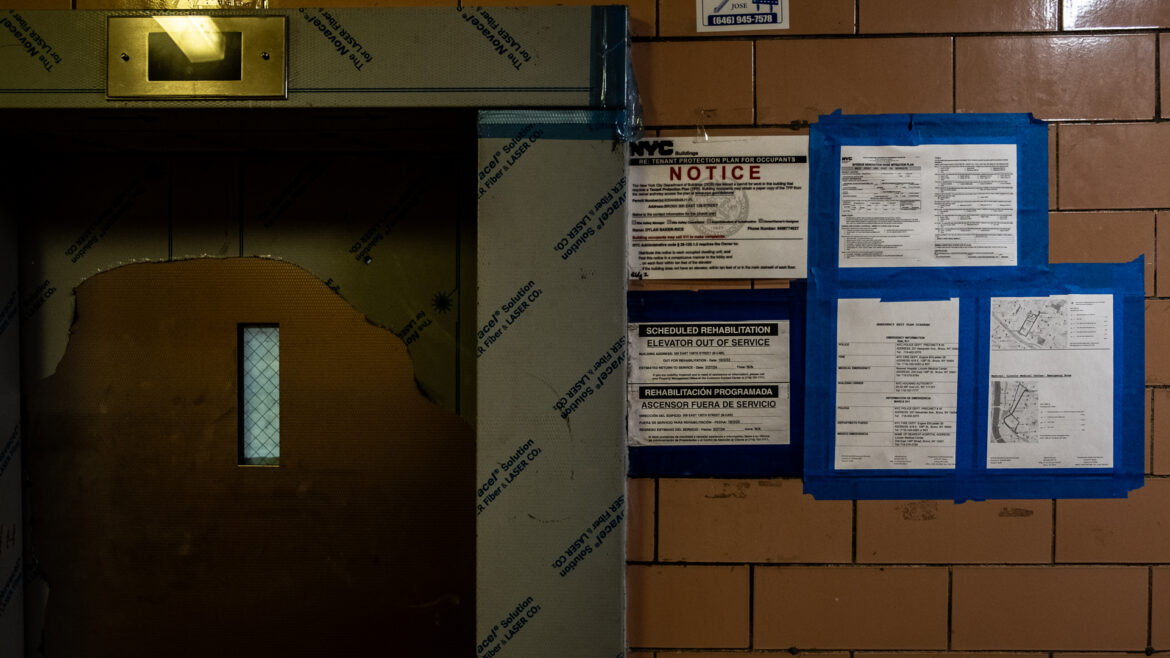
Adi Talwar
An out-of-order elevator at NYCHA’s Mitchel Houses.Arnold lives adjacent to Bronx River Addition Houses, where her neighbors will begin voting next week on whether to adopt an alternative funding model for repairs.
The ballot will include the Permanent Affordability Commitment Together (PACT) program—an initiative that allows private developers and management companies to maintain NYCHA properties—and the Public Housing Preservation Trust, which would use bonds and mortgages to fund repairs while maintaining NYCHA management.
Residents could also vote to remain in traditional public housing. NYCHA currently manages 161,400 apartments citywide, while 18,018 are part of PACT. Nostrand Houses in Sheepshead Bay became the first complex to join the Trust in December.
Manhattan Assemblymember Harvey Epstein joined Tuesday’s rally, telling the crowd that there is an urgent need to preserve public housing with public resources.
NYCHA, which has faced federal disinvestment for decades, announced last summer that it needs close to $80 billion to cover its capital repair needs over the next 20 years.
“The answer that you hear from the city and the state is just privatize it,” Epstein said. “The answer is to invest in public housing, the answer is to support our public housing and to fight for our public housing residents every single day.”
The $3.55 billion the group is seeking for repairs for the city’s public housing is significantly more than what Albany has previously provided: a spokesperson for NYCHA said that since 2016, the housing authority has locked in more than $1 billion in state funding for capital projects such as elevators, heating systems and building facades.
“This year, we will be looking to our state partners to provide an additional $500 million to invest in the preservation of public housing in New York City,” the spokesperson said.
Of the $500 million advocates are seeking to cover rent arrears for public housing residents, $335 million would go to NYCHA, according to advocacy organization Community Voices Heard.
Last year, public housing and Section 8 residents were at the back of the line for federal COVID rent relief dollars, provided through the Emergency Rental Assistance Program (ERAP). More than 33,000 NYCHA residents applied for $128 million from the program, which the state administered and eventually supplemented.
Last year’s state budget included $391 million in additional ERAP funding. In May, Gov. Kathy Hochul’s office said these funds would go primarily to NYCHA. In November, Mayor Eric Adams announced that $95 million in ERAP funding had reached NYCHA so far.
“This money was a lifeline for thousands of families across the state, but it has not eliminated the severe funding gap that has left our public housing stock in disrepair, nor the mounting rental arrears that threaten to put families on the street,” Assemblymember Grace Lee said in a statement.
As of October, 69,596 NYCHA households had rent arrears, according to the Preliminary Mayor’s Management Report. Arrears are worth $482 million as of Feb. 29, according to NYCHA.*
Iziah Thompson, a senior policy analyst with the Community Service Society (a City Limits’ funder) noted that advocates’ overall $5 billion ask is just 20 percent of Gov. Kathy Hochul’s five-year, $25 billion housing plan—a range of proposals first announced in 2022.
Reached for comment, Hochul spokesperson Justin Henry stated that the governor is “deeply committed” to supporting public housing residents.
“Which is why she has delivered $1.25 billion in capital dollars for NYCHA improvements, made an additional $391 million investment in rental assistance, and signed New York’s first-in-the-nation public housing preservation trust into law,” he said. “The governor will continue working with the legislature on solutions to improve public housing in our state.”
Arnold said the fight for more funding will be ongoing. On Monday, public housing tenants and organizations including the Good Old Lower East Side (GOLES), Take Root Justice and Residents to Preserve Public Housing will be heading north.
“We’re going back to Albany,” she said.
To reach the reporter behind this story, contact Tatyana@citylimits.org. To reach the editor, contact Emma@citylimits.org.
Want to republish this story? Find City Limits’ reprint policy here.
*This story has been updated with additional information on NYCHA’s rent arrears. It has also been corrected to reflect that advocates anticipate funding would cover the cost of 25,000 public housing units outside of New York City, not 10,000. The spelling of Iziah Thompson’s last name has also been corrected. City Limits regrets the errors.


